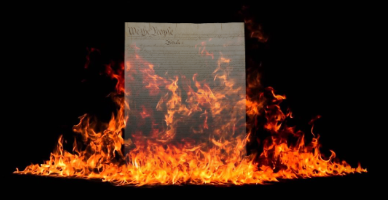
Everything happens faster in the modern world than it used to.
This is natural.
It’s basically a side-effect of more advanced technology.
Communications are faster; transport of people and goods is faster. Change, even, in infrastructure and society is faster.
Because the technology we use to do all those things is faster, and the systems we use to manage all of these things are much more interconnected so changes spread through them faster.
Collapse is faster as well.
In previous millennia, it would have taken generations for an empire like the United States to crumble.
Heck, it could take a generation for people in the far-flung reaches of an empire to even find out about changes in the center.
Which was fine; well, fine-ish.
Other than the urban cores, most people in any ancient empire would have lived largely locally self-sufficient lives and only depended on the central State for defense against external threats and banditry.
But most of the people did not depend on long-distance trade for the necessities of life. They would have had access to local goods, resources and expertise enough to continue on their own for quite some time.
So losing the connections the empire provided would not necessarily have immediately been a catastrophic loss.
That is not the case in the modern world.
For one thing, the significant majority of people now live in the urban cores (and their immediate vicinities) and as ever the cities are completely dependent on external links for food, water, gas and electricity.
And none of the cities have more than a few days of anything in reserve.
And even the rural areas are completely dependent on long-distance links for gasoline and electricity.
So any significant disruption to water, power or transport would be an immediate catastrophe.
A disruption like, say, the central State being dismantled from within.
Our systems are faster now, and much more interconnected, but they are fragile. A small change in one place can have large effects in another, and there are few buffers or reserves built in anywhere to make the systems resilient.
So the sudden disassembly of the central State bureaucracy is an immediate threat to everyone today in a way that it just would not have been in the past.
It really would behoove us to be more careful with our stability than we had to be in the past.
But that, sadly, is not the case.
We may or may not be able to weather the current crisis without a complete collapse; we won’t know whether we’ve hit the “all at once” phase until it happens.
There’s little that most of us can do now to make our infrastructure more resilient. But we can try to add some resiliency individually, for ourselves and our neighbors.
And we can think about how, later when the opportunity arises, we could design an industrial civilization for genuine resilience.
- Bad Politics: Welcome To The Jungle Primary - 2026-02-16
- AIpocalypse: Generative AI Cannot Be Reliable - 2026-02-13
- C’mon Democrats: Zero Votes For Fascism - 2026-02-11
